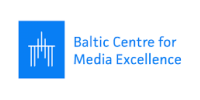Insights and Strategies from the BaltsTeachMil Fact-Checking Zoominar
On October 19th, the second BaltsTeachMil Zoominar, titled “Fact-Checking Masterclass,” took place. The Zoominar workshops were conducted in all three Baltic languages and featured local experts: Estonian teacher and fact-checker Kaili Malts from Delfi EE, Latvian fact-checker Ronalds Siliņš from Re:Baltica, and Lithuanian expert Darius Remeika from Vytautas Magnus University. All three workshops provided attendees with valuable practical insights into how to teach critical information searching and fact-checking in their classrooms or communities.
The Estonian workshop had a dual focus: why fact-checking matters and what can be the negative outcomes of mis- and disinformation spreading online. When it comes to verifying online information, the initial step involves using search engines like Google or Bing, extending the search beyond the initial results page, and adding “fact-check” to the query to discover more helpful articles. It was also emphasized that assessing the source of information is critical; for instance, when a post refers to a study, thoroughly examining the study itself is essential to validate its accuracy. Recognizing biases in content creators, whether they have political or commercial interests, is a crucial aspect, with indicators like donation links, group invitations, and calls to action being important signals. Additionally, not being afraid to ask experts for help while fact-checking was emphasized. Anyone can find experts to contact via googling. Also, using reverse image search for visual content verification was discussed. To conduct a reverse image search just copy paste/download and upload the picture to your preferred search engine and see similar content or the source of the picture. If you want to reverse search a video, just screenshot the first seconds of it and do the latter.
In the Latvian workshop, attendees were given tips on how to spot potential red flags that might signify misinformation. Key indicators include content that evokes strong emotions or deals with sensitive subjects, as these can lead to anger, sadness, shock, or despair. The workshop stressed the significance of source citations, as the absence of references may suggest fabricated information. The workshop explored how mixing news with entertainment can sometimes result in the loss of critical details, making the story more humorous or interesting but potentially less accurate. Being cautious when information aligns closely with pre-existing beliefs was also stressed, as even the most blatant falsehoods can deceive those who want to believe them. Participants were encouraged to assess whether their chosen source was the sole presenter of the information or if multiple perspectives existed. They were also advised to check the publication date, as old information might no longer be relevant. Various tools were introduced, such as image search engines like Google, Tiny Eye, and Yandex, academic publication search engines like Google Scholar and Pubmed, translation tools like Google Translate and Deepl, and databases such as Eurostat, Our World in Data, and national statistical offices. And in case all else fails, attendees learned to turn to reliable fact-checking organizations, including those associated with IFCN, for additional validation.
The Lithuanian workshop focused on dichotomous thinking, which is the reason for society’s polarization. Dichotomous thinking leads us to divisive communication and actions, for example, hatred speech on social media. The workshop leader Darius Remeika performed several exercises with the audience to show that we are used to thinking about things by categorizing them either into black or white zones. Additionally, the workshop addressed several common cognitive errors that individuals tend to make while fact-checking, including confirmation bias, which involves seeking information that aligns with pre-existing beliefs, the salience effect, which leads us to prioritize attention-grabbing details, and the availability bias, which results from the limited availability of objective information. The primacy effect, stemming from our initial exposure to information that significantly shapes our opinions and can be resistant to change, and knowledge bias, as our expertise becomes more specialized, making it challenging to consider broader perspectives, were also discussed.
Participants in all three workshops valued the overall teaching approach, practical tasks, participant engagement, and relevant examples. Participants appreciated the freedom and coordinated communication during the seminar, though some felt that time spent on assigning people to separate could have been utilized for teaching.







